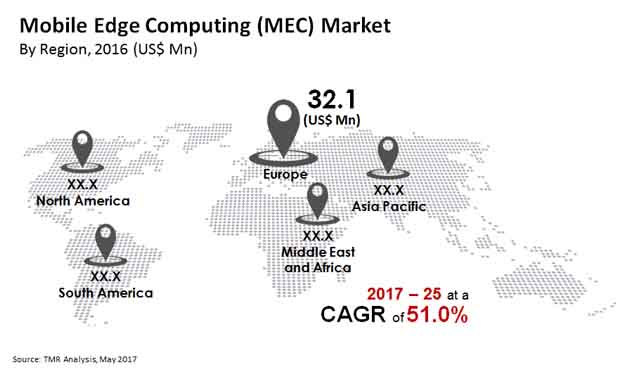
The global mobile edge computing (MEC) market is led by numerous titans in the field which are coming up with advanced software and hardware solutions helping them to easily gain a competitive edge above the others, states Transparency Market Research (TMR) in its latest research report. Some of the leading companies within the global mobile edge computing market are Huawei Technologies Co., Ltd., IBM Corporation, Integrated Device Technology, Inc., PeerApp Ltd., Nokia Corporation, Intel Corporation, ADLINK Technology Inc., Juniper Networks, Inc., Saguna Networks Ltd., ZTE Corporation, Vasona Networks, Inc., and SpiderCloud Wireless, Inc. The market is dynamic in nature characterized by high competitiveness. Market players are investing extensively in cutting-edge technology to stay ahead of the game. Players are constantly looking for developing effective solutions in order to cater to the different requirements of end-use companies.
According to TMR, the global mobile edge computing (MEC) market will expand at a whopping 51% CAGR from 2017 to 2025 to be worth US$4228.3 mn by 2025. On the basis of component, the hardware segment accounted for a massive share of 80% of the total market in 2016. The entire mobile edge computing architecture is comprised of different hardware such as servers, routers, processors, and switchers, therefore it is not surprising that the hardware segment is leading and will continue to do so in the years to come.

Europe to Continue to Lead in MEC Market Boosted by High Uptake of IoT Devices
On the basis of geography, Europe is leading in the market accounting for 43.5% of the market in 2016 on account of the rising usage of data as well as growing adoption of devices which make use of the Internet of Things, thereby boosting the uptake of mobile edge computing. It is anticipated that Europe will witness and expansion of 42.8% CAGR between 2017 and 2025. As North America is home to several hardware and software manufacturers, this region will also be a key market for mobile edge computing. Promising growth can also be expected in the Middle East, South America, and Asia Pacific on account of the rising number of mobile subscribers and increasing number of IoT devices.
Request Sample For More Information@
https://www.transparencymarketresearch.com/sample/sample.php?flag=S&rep_id=16496
From a geographical standpoint, Europe accounts for a leading share in the global mobile edge computing (MEC) market. In 2016, its market accounted for a share of 43.5%. This is mainly on the back of growing uptake of mobile edge computing on account of increasing monthly data usage and the rising adoption of devices having Internet of Things (IoT). In the next few years, the Europe mobile edge computing (MEC) market is predicted to register a CAGR of 42.8%.
North America is another crucial market for mobile edge computing (MEC), which is being fuelled by the U.S. North America is home to most of the hardware and software vendors and is expected to remain a key contributor in the next couple of years as well.
Asia Pacific, South America, and the Middle East are slated to be the most promising markets going forward because of the burgeoning mobile subscribers and IoT devices that support market growth for mobile computing market. At present, the global mobile edge computing (MEC) market is being driven by the demand from developed nations, particularly those in Europe and North America. In future, it will be the emerging economies in Asia Pacific and the Middle East and Africa.
Request For Customization Report@
https://www.transparencymarketresearch.com/sample/sample.php?flag=CR&rep_id=16496
Some such prominent names in the global mobile edge computing (MEC) market are IBM Corporation, Huawei Technologies Co., Ltd., Integrated Device Technology, Inc., Nokia Corporation, PeerApp Ltd., Intel Corporation, Juniper Networks, Inc., ADLINK Technology Inc., Saguna Networks Ltd., Vasona Networks, Inc., ZTE Corporation, and SpiderCloud Wireless, Inc.





